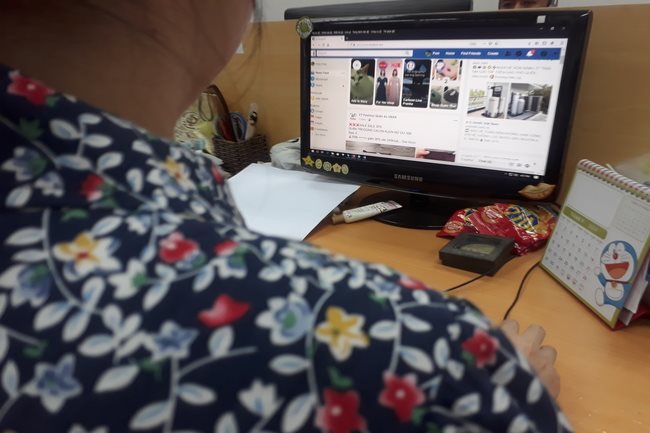- © Copyright of Vietnamnet Global.
- Tel: 024 3772 7988 Fax: (024) 37722734
- Email: evnn@vietnamnet.vn
Social network
Update news Social network
How will Vietnam’s social networks compete?
 Lotus, the newly launched ‘made in Vietnam’ social network, aims to focus on distributing content for press agencies and entertainment content producers.
Lotus, the newly launched ‘made in Vietnam’ social network, aims to focus on distributing content for press agencies and entertainment content producers.
Made-in-Vietnam Lotus network launched, aiming to have 60 million users
 The Vietnamese social network Lotus revealed its plan to attract 60 million users in Vietnam during its official launch in Hanoi last night.
The Vietnamese social network Lotus revealed its plan to attract 60 million users in Vietnam during its official launch in Hanoi last night.
Vietnamese lose Facebook accounts after watching unlicensed movies
 Many uers are invited to log on to a website with their Facebook accounts to ‘watch high quality movies’. As a result, they have lost their Facebook accounts.
Many uers are invited to log on to a website with their Facebook accounts to ‘watch high quality movies’. As a result, they have lost their Facebook accounts.
Made-in-Vietnam social network Lotus to be launched this week
 VCCorp has announced that the pilot version of its VND700 billion ($30.1 million) Lotus social network will officially be launched on September 16.
VCCorp has announced that the pilot version of its VND700 billion ($30.1 million) Lotus social network will officially be launched on September 16.
Pirated software community dying in Vietnam
 Stricter copyright policy and people’s higher awareness about intellectual property have led to the closure of many websites which shared pirated software.
Stricter copyright policy and people’s higher awareness about intellectual property have led to the closure of many websites which shared pirated software.
Chinese digital content firms flock to Vietnam market
 The community of Vietnamese TV service providers has been stirred up by the news that Baidu and Tencent have begun selling VOD (video on demand) with subtitles in Vietnamese, collecting fees from VIP subscribers in Vietnam dong.
The community of Vietnamese TV service providers has been stirred up by the news that Baidu and Tencent have begun selling VOD (video on demand) with subtitles in Vietnamese, collecting fees from VIP subscribers in Vietnam dong.
Is Vietnam challenging Facebook to single combat?
 To build a Vietnamese social network and cement its position in Vietnam, the first thing that needs to be done is to defeat Facebook.
To build a Vietnamese social network and cement its position in Vietnam, the first thing that needs to be done is to defeat Facebook.
Anti-hacking services charge high fees
 Many Vietnamese pay a fee to have their Facebook accounts protected, but experts have recommended against it.
Many Vietnamese pay a fee to have their Facebook accounts protected, but experts have recommended against it.
Vietnamese social network debuts, competes with Facebook
 A social network, called Gapo, created by Vietnamese and designed for Vietnamese youth, has been launched.
A social network, called Gapo, created by Vietnamese and designed for Vietnamese youth, has been launched.
Does Zalo want to be a social network?
 If it operates as a social network, Zalo will at a disadvantage compared with foreign social networks.
If it operates as a social network, Zalo will at a disadvantage compared with foreign social networks.
Vietnam needs to create national social network to replace Facebook: Minister
 Vietnam needs to have its own social network and search engine to replace foreign platforms Facebook and Google, said Minister of Information and Communications Nguyen Manh Hung at a recent meeting with IT firms in HCMC.
Vietnam needs to have its own social network and search engine to replace foreign platforms Facebook and Google, said Minister of Information and Communications Nguyen Manh Hung at a recent meeting with IT firms in HCMC.
How is the new VietNamTa social network faring?
VietNamNet Bridge - It’s still too early to tell if VietNamTa, which means ‘our Vietnam’, will be popular among Vietnamese, but it is getting more users day by day.
The MoMo Challenge on the internet: parents fear for their children
VietNamNet Bridge - “The MoMo Challenge is challenging our parenting skills,” BB, a mother wrote recently on her Facebook page, calling it a “nightmare”.
Vietnam plans to create its own Facebook-like social network, say experts
VietNamNet Bridge - Facebook remains the social network dominant in Vietnam with 60 million users a month.
Are Vietnamese social networks powerful enough to replace Facebook?
The government of Vietnam has placed an unprecedented order: create a social network for Vietnamese. If this happens, Vietnam will be able to pocket hundreds of million of dollars from online ads and get other benefits.
Google+ shutting down after users' data is exposed
Google is shutting down much of its social network, Google+, after user data was left exposed.
Minister wants to develop made-in-Vietnam social media
VietNamNet Bridge - Vietnam needs a digital ecosystem with focus on made-in-Vietnam social media instead of foreign owned players such as Facebook and Google.
Should students be taught how to manage their money?
Sociologists and psychologists all agree that it is necessary to teach personal finance management skills at school.
Mark Zuckerberg vows to 'fix' Facebook
Facebook CEO Mark Zuckerberg has vowed to "fix" Facebook, in what he described as his personal challenge for 2018.
“Game of social network giants” to battle over youngsters
VietNamNet Bridge – In an era when virtual space takes the throne, everyone’s activities can become public common property. As youngsters today find that Facebook is no longer a safe sanctuary for their privacy,



















